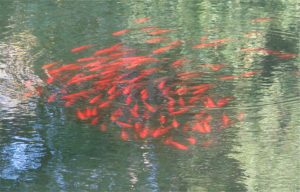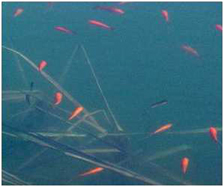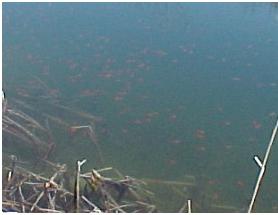Goldfish are a No! No! for Earth Ponds. Here’s Why…
Do you have Goldfish in your Pond?
 Is it possible that this small, benign looking goldfish (Carassius auratus) may be the wrong choice for your pond? Seeing goldfish in ponds around the Eastern Townships are a common sight these days. Maybe you have them in your own pond or you are considering stocking it with goldfish. You may want to think again.
Is it possible that this small, benign looking goldfish (Carassius auratus) may be the wrong choice for your pond? Seeing goldfish in ponds around the Eastern Townships are a common sight these days. Maybe you have them in your own pond or you are considering stocking it with goldfish. You may want to think again.
It is technically illegal to introduce goldfish in earth ponds in Quebec. This means any bassin that can have its overflow in natural streams. Goldfish are a species that is legally sold for the aquarium industry and it is expected that all owners will keep them in a closed system like an aquarium or a water garden. Unfortunately, they are often introduced into man-made ponds that have water overflow systems where the little rascals can escape to the watershed below. The ministry of environment is revisiting the laws regulating fish introduction into man-made ponds due to their impacts on natural ecosystems.
 Once free to roam into the wilderness, goldfish find few limits in their search of habitat. They adapt very well to water between 0 and 41 degrees Celsius but prefer colder water. They can double their population numbers every 2 years and may grow to a maximum of 3 kg. They live many years. Their feeding habits are detrimental to all the other indigenous fish species because they like to eat everything from plants, small crustaceans, insects, fish eggs and detritus.
Once free to roam into the wilderness, goldfish find few limits in their search of habitat. They adapt very well to water between 0 and 41 degrees Celsius but prefer colder water. They can double their population numbers every 2 years and may grow to a maximum of 3 kg. They live many years. Their feeding habits are detrimental to all the other indigenous fish species because they like to eat everything from plants, small crustaceans, insects, fish eggs and detritus.
They basically have no predators. In nature, anything that is bright and colourful spells “I am not good to eat! I will poison you!” The monarch butterfly, the ladybug, and Amazon’s orange poison frog are good examples. The goldfish’s bone structure also makes them very tough to eat so the usual fish eaters like herons, kingfishers and raccoons avoid eating goldfish.
 In a closed pond system, goldfish will reproduce until the population reaches the milieu’s maximum carrying capacity for food and space. Being mostly benthic feeders, they stir the bottom sediments for food. Those sediments become suspended making the water murky and not aesthetic. Furthermore, the ammonia contained in the fish waste causes an imbalance in the water chemistry of the pond.
In a closed pond system, goldfish will reproduce until the population reaches the milieu’s maximum carrying capacity for food and space. Being mostly benthic feeders, they stir the bottom sediments for food. Those sediments become suspended making the water murky and not aesthetic. Furthermore, the ammonia contained in the fish waste causes an imbalance in the water chemistry of the pond.
As responsible pond owners, we should do whatever is in our capacity to prevent goldfish (or any other non-indigenous species) from being introduced in the local water systems. Once introduced, we should try methods to limit their growth or at least prevent them from leaving, which is a difficult task indeed.
Rotenone is the only natural product that can eliminate all the fish in your pond without emptying it. The ministry of environment has a list of accredited biologists that can do the job properly. Other methods are more drastic like pumping the pond empty to let it dry. Again this may not be successful since goldfish have been found surviving in the mud for days waiting for the water to return.
Related Articles:
- The Right Fish for Your Pond
- Winter Under the Ice: The Dreaded Fish Kill
- Fish Habitat: Does Aeration Heat Up the Pond?